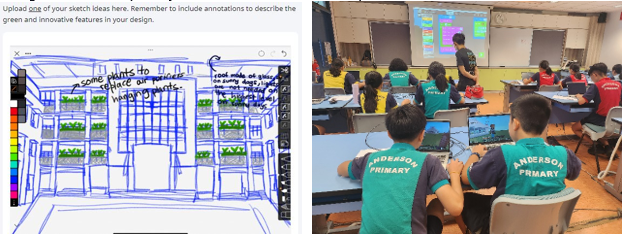Applied Learning Programme (ALP) STEM Education
Overview
As Pioneers of the Future, learning is re-imagined at Anderson Primary School through Eureka!, our Applied Learning Programme (ALP) in STEM Education (Material Science).
Eureka! focuses on igniting students’ natural curiosity and developing learners with a dare-to-try spirit and the passion to explore the various disciplines of Science, Technology, Engineering and Mathematics (STEM).
Through purposeful multi-disciplinary learning experiences, Andersonians will apply their learning to real-world contexts to become active, creative and caring environmentalists and change agents, knowledgeable in the use of materials and matter. Deep learning will be promoted by connecting classroom learning with real-life applications and providing opportunities for Andersonians to apply concepts to solve authentic problems.
Eureka! comprises STEM modules delivered through the curriculum, after-school enrichment and CCA. These STEM modules focus on experiential learning, self-discovery through doing, and the cultivation of the thinking dispositions of a Mathematician, Scientist and Engineer. The Engineering Design Process is used to scaffold students’ thinking, facilitate problem-solving and provide the structure for product design. We hope that these varied learning experiences will inspire Andersonians, as Pioneers of the Future, to contribute towards STEM research, innovation and enterprise and pursue STEM-related careers to serve the good of society.
Multi-Disciplinary Eureka! Modules
P1 Eureka! with the Catapult
How can you knock down castle walls without being anywhere near them?
Students explored the history of catapults and how they work before making
theirs using recycled materials such as a bottle cap, ice cream sticks,
tape and rubber bands. After launching an object from their self-constructed
catapult, students earn their very own Eureka! badge.
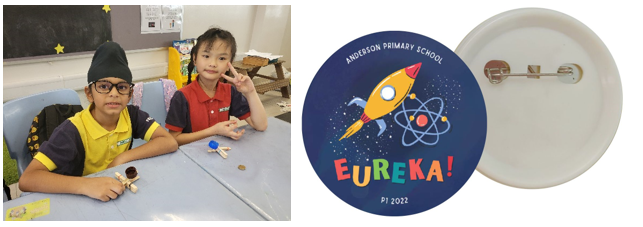
P2 Eureka! goes outdoor with PAL – Transforming Food Waste into Sustainable Soil Materials
Core ideas and practices of science are infused with the lower primary
PAL – Outdoor Education module to complement and broaden Andersonians’
perspectives as they explore the diversity of plants around them. As budding
Young Botanists, students identified leaves of different shapes and sizes
and used their creativity to make various leaf art pieces.

Students also attended a Microgreen enrichment workshop to use sustainable fertilisers such as Cocopeat and Vermicast to grow microgreens in a fabric planter. Students learnt about the phases of a Microgreen Life Cycle and compared the properties of different materials (e.g. fabric, bamboo, cork) used to make fabric planters.

Taking on the role of a Zero Waste Ambassador, students created a stationery prototype using recycled materials. The Engineering Design Process was used to facilitate this prototyping phase. Students applied what they learned about Materials and made pieces of stationery using paper and plastic.
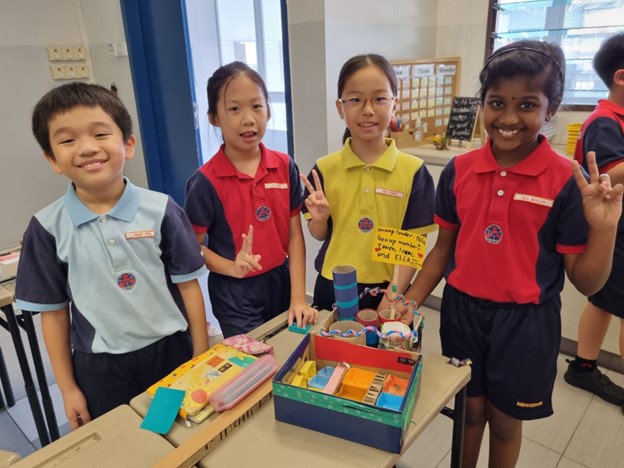
P4 Eureka! in Zero Waste Management – Textile Upcycling & Material Repurposing
Students continued their Zero Waste journey by managing paper and plastic
waste and learning about the properties of different fabric types. They
learnt how old clothes could be given a new lease of life. Old clothes
were upcycled into products which served another purpose. Students made
beautiful pencil cases, tote bags, bookmarks, coasters and tissue packet
holders from used clothes. It was an enriching and enlightening experience
to learn about a Fashion Circular Economy within the school.
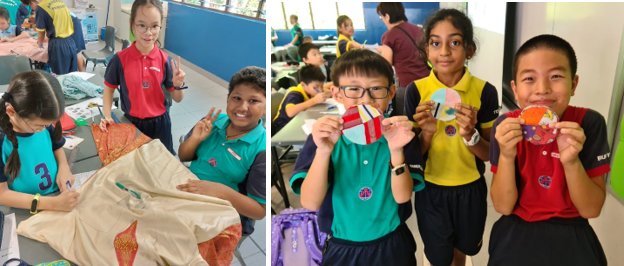
P5 Eureka! in Food Waste Management – Technologies in Urban Farming
Following their experience from the Primary 2 Microgreen Cultivation,
Primary 5 students deepened their learning by being an urban farmer who
grows food using a high-technology farming system. Students grew crops
in a vertical farming tower and journeyed as young engineers to explore
the use of micro:bits in the automation of processes in a mini-farm prototype.
Indeed, there were many Eureka! moments for students
in this journey towards fostering food resilience.
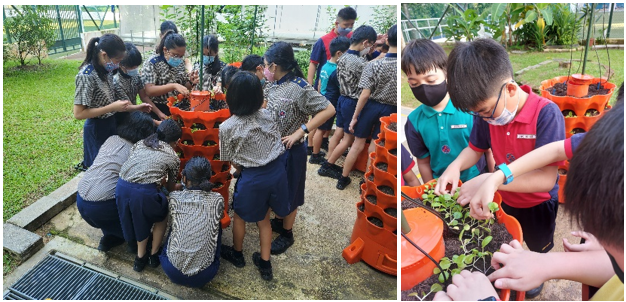
We believe that every Andersonian can become responsible and reflective citizens, and Environment Stewards of Sustainability. Together, we can build a resilient future in food security by growing crops sustainable soil materials and high-tech farming systems.
P6 Eureka! in Green Energy Sources – Designing Biophilic-Eco Buildings
As a finale to the series of Eureka! STEM modules,
Primary 6 students were tasked to re-design the school building to promote
energy efficiency. Students researched green sources of energy and examples
of local and overseas Biophilic Eco-buildings that were able to reduce
overall energy consumption. Putting their learning from the 4-hour Minecraft
workshop into action, students create a practical and sustainable building
design and subsequently build it in Minecraft to be presented to classmates.
